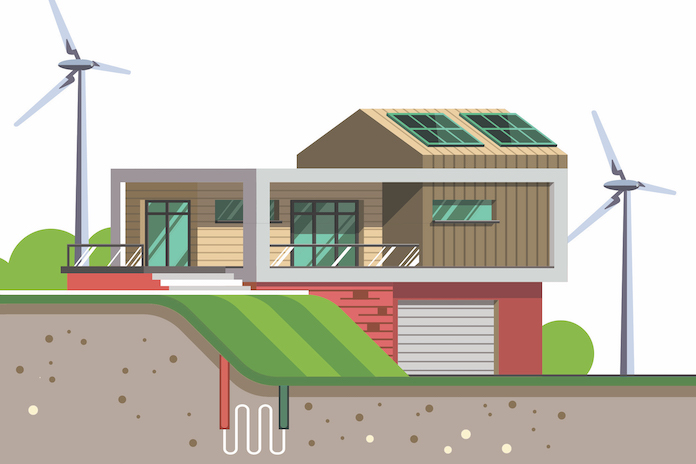
The government is to extend the Green Homes Grant voucher scheme by a year, as well as committing to make public buildings more efficient, as part of a £12bn investment plan to help the UK to reach net zero by 2050.
Announced by Prime Minister Boris Johnson today, the “blueprint” comes in the run-up to the COP26 climate summit in Glasgow next year.
As part of a raft of measures, the government has committed £1bn next year into making new and existing homes and public buildings more efficient, by extending the Green Homes Grant voucher scheme by a year and cutting bills for hospitals and schools, as part of the Public Sector Decarbonisation Scheme.
The government has also pledged up to £500m to explore the use of hydrogen as a fuel, including trialling homes using hydrogen for heating and cooking, starting with a Hydrogen Neighbourhood in 2023, moving to a Hydrogen Village by 2025, with an aim for a Hydrogen Town – equivalent to tens of thousands of homes – before the end of the decade. Of this funding, £240m will go into new hydrogen production facilities.
It has also committed £525m to help develop large and smaller-scale nuclear plants, and research and develop new advanced modular reactors.
Meanwhile, the UK will end the sale of new petrol and diesel cars and vans by 2030, ten years earlier than originally planned. The sale of hybrid cars and vans that can drive a significant distance with no carbon coming out of the tailpipe will be allowed until 2035.
To help accelerate the uptake of electric vehicles, the government has announced £1.3bn to accelerate the rollout of chargepoints for electric vehicles, as well as £500m to be spent in the next four years for the development and mass-scale production of electric vehicle batteries.
The government has also issued a 10-point plan setting out the UK’s strategy for reaching net zero by 2050. They include:
- Offshore wind: Quadrupling capacity to 40GW by 2030.
- Hydrogen: Working with industry aiming to generate 5GW of low carbon hydrogen production capacity by 2030 for industry, transport, power and homes, and aiming to develop the first town heated entirely by hydrogen by the end of the decade.
- Nuclear: Large-scale nuclear and developing the next generation of small and advanced reactors.
- Electric vehicles: Transforming the national infrastructure to better support electric vehicles.
- Public transport, cycling and walking: Making cycling and walking more attractive ways to travel and investing in zero-emission public transport of the future.
- Jet Zero and greener maritime: Supporting difficult-to-decarbonise industries to become greener through research projects for zero-emission planes and ships.
- Homes and public buildings: Making homes, schools and hospitals greener, warmer and more energy efficient by 2030, and a target to install 600,000 heat pumps every year by 2028.
- Carbon capture: Becoming a world-leader in technology to capture and store harmful emissions away from the atmosphere, with a target to remove 10MT of carbon dioxide by 2030.
- Nature: Planting 30,000 hectares of trees every year.
- Innovation and finance: Developing the cutting-edge technologies needed to reach these new energy ambitions and make the City of London the “global centre of green finance”.
Johnson said: “Although this year has taken a very different path to the one we expected, I haven’t lost sight of our ambitious plans to level up across the country. My Ten Point Plan will create, support and protect hundreds of thousands of green jobs, whilst making strides towards net zero by 2050.”
Responding to the plan, the Chartered Institute of Building (CIOB) said: "The CIOB welcomes the extension of the Green Homes Grant by a further year as it will give industry and consumers further time to make use of the scheme and ensure that all work is carried out to the highest standards. However, the Institute is disappointed to see that the Government has not included a national retrofit strategy as part of its plan for green buildings.
"While it is a positive step that the Government recognises the importance of making homes, schools and hospitals more energy efficient, a long-term roadmap is needed to give the built environment sector the certainty it needs to invest in green technology and low carbon skills. Ultimately, the £12bn allocated in this plan is a drop in the ocean compared to the amount that will be needed to ensure that our built environment is fit to meet the net zero target.
"The CIOB urges the Government to make a national retrofit plan a core part of its Industrial Strategy and key infrastructure priority, to support jobs and help to eradicate the UK’s contribution to climate change.
Comments
Comments are closed.










Is it the English Government or the British Government that is Extending
The “Green Holmes”??
It does make a Difference??